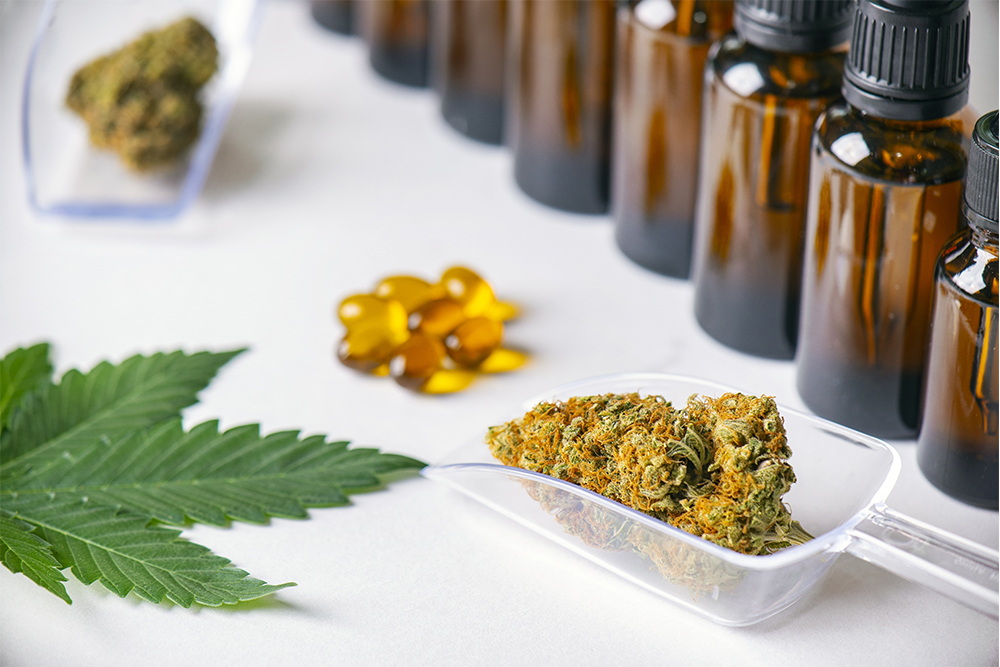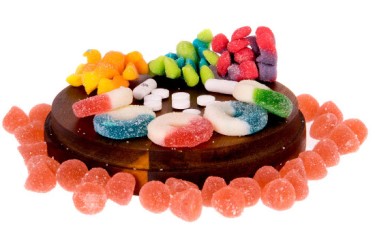Healthcare
How Do You Pick Out High Quality Hemp CBD Edibles?

What are some good tips on how to pick out high quality hemp CBD edibles?
You will see goods like cannabis-oil-infused food, confectionery, patches, oils, tinctures, ointments, and more as larger corporations enter the marijuana production sector. There are more sub-types and speciality products inside each of these product categories. Cannabis or Hemp oil is one of the broadest classifications.
If you’re looking to buy hemp oils, delta 8 gummies, capsules or tea, these are some of the most crucial things to keep in mind.
Types of Hemp Edibles
Many individuals believe that Hemp oil is generic and that all cannabis-derived oils are the same. While this may have been true in the past, various kinds of cannabis oil are available. Many of these kinds are only found in certain areas. For example, certain strains of cannabis originated in Australia, and you can get them in their purest form or as blended oil containing various types of oil derived from various strains of cannabis. Oil has the advantage of being significantly easier to transport than the plant itself. You may be confident that you will receive oil in excellent condition, whether it comes from another country or a different region of the country. Ensure you know whether you’re getting the right oil or gummies for your needs and which strain you’re getting.
- Hemp source
CBD is derived from two types of cannabis: regular marijuana and hemp, a type of marijuana. The main difference between these two sources is that hemp should have less than 0.3% THC.
Cannabidiol derived from hemp is legal in the United States, while CBD derived from cannabis may not meet these requirements. All the hemp edibles made from hemp plants are safe to consume because it ensures that they contain the legal quantity of THC. However, users should check their state’s rules on edible hemp-derived products.
As per Hempercamp, a CBD and hemp products review website, hemp source and subsequent harvesting is the key to get the finest quality edibles, which are little expensive. Many consumers sometime complains of substandard products that flooded the market with cheap price.
It is wise to buy from the right dispensary or online store. Want to know how to find the best marijuana dispensaries near your place? You can take the help of Google Map and search phrases like “how to buy weed near me” or “recreational dispensaries near me” or “CBD stores near me”. The “near me” phrase helps you to get the location of the nearest dispensaries from Google.

Buying them fresh
Hemp gummies and capsules are made with preservatives, and it does not matter if it is fresh or not but hemp oil, like any other organic product, has a shelf life after which it can no longer be used. Ideally, it would help if you bought as fresh as possible to ensure the highest possible quality. The hemp oil begins to deteriorate and distort at a microscopic level once removed. The more recent the purchase, the fewer these alterations will have occurred. Hemp oil will only last two years in storage at most. After that threshold, it is best not to continue to use it.
Best Flavors
Although the strain from which the oil is obtained has a natural flavour, many manufacturers enhance the flavour with different added substances. If you want the most natural flavour, choose something cold-pressed and containing no artificial flavours. If you are looking for CBD gummies specifically, there is a wide range of flavours available, including watermelon and mint chocolate. If you’re using tinctures or something else where the flavour is more obvious, you might want to try flavoured hemp oil.
Also read fun facts about CBD here.
Quantity of Purchase
While buying in bulk is always cheaper, lesser quantities of hemp oil are preferable. Get a tiny quantity to test the flavour, and if you like it, purchase more. Furthermore, because the flavour and effect of the oil can change with time, you should purchase an amount that will last you no longer than 6 months. After 6 months, the substance may begin to taste and behave significantly differently, so it’s better to keep a fresh supply on hand. Other hemp products like capsules and gummies usually last longer, up to 1 or 2 years.
Best Places of Purchase
Local shops are convenient and accessible and found across the states, but that’s frequently where the benefits end. When purchasing hemp oil locally, you can rely completely on the employees’ product knowledge. This limits your research possibilities and the products you can choose from. Local stores typically carry two varieties of hemp products, which is significantly less than internet sellers. The best way to buy is online. You can do all the research and read reviews and view authentic certifications, which would only help you make the best choice.
- Third-Party Lab Reports
CBD companies often subject their products to third-party testing to ensure their efficacy, authenticity, and safety. Most companies use independent labs to examine their products for hemp profiles, chemicals, heavy metals, solvents, and various other contaminants. The brands then post the findings of third-party lab tests on their websites for all to see.
Choose premium hemp edible with a third-party lab-testing system. The results will provide you peace of mind, knowing that the creators and the analysts are willing to take responsibility. Third-party lab tests are essential for internal control, ensuring that each batch of hemp extract follows the protocols.
- The Right Concentration
When deciding between different hemp oils especially, individuals look at the concentration first. Because everyone is different and reacts to CBD differently, there is no one-size-fits-all CBD dosage. Some people will benefit from dosages of as little as 5–10 mg, while others will need upwards of 50 mg. So which concentration should you choose?
Low-concentration hemp oil and products are typically chosen for micro-dosing, administering extremely small dosages of CBD throughout the day to keep endocannabinoid levels stable. People who are new to this use low-potency oils to find the proper dosage and evaluate the cost-effectiveness of their product. Low-concentration oils and products may be prohibitively expensive when using high dosages of hemp. The lower the price per milligram of hemp, the longer the product will last.

THE BOTTOM LINE
When it comes to purchasing hemp oil and other edibles, research on the subject is crucial. Always double-check the hemp source, extraction procedures, third-party testing, corporate transparency, and reputation among CBD consumers. The type of CBD, intake method and potency will all influence your decision; these aspects should be tailored to your lifestyle preferences and desired results.
Source: https://cannabis.net/blog/opinion/how-do-you-pick-out-high-quality-hemp-cbd-edibles
Business
New Mexico cannabis operator fined, loses license for alleged BioTrack fraud

New Mexico regulators fined a cannabis operator nearly $300,000 and revoked its license after the company allegedly created fake reports in the state’s traceability software.
The New Mexico Cannabis Control Division (CCD) accused marijuana manufacturer and retailer Golden Roots of 11 violations, according to Albuquerque Business First.
Golden Roots operates the The Cannabis Revolution Dispensary.
The majority of the violations are related to the Albuquerque company’s improper use of BioTrack, which has been New Mexico’s track-and-trace vendor since 2015.
The CCD alleges Golden Roots reported marijuana production only two months after it had received its vertically integrated license, according to Albuquerque Business First.
Because cannabis takes longer than two months to be cultivated, the CCD was suspicious of the report.
After inspecting the company’s premises, the CCD alleged Golden Roots reported cultivation, transportation and sales in BioTrack but wasn’t able to provide officers who inspected the site evidence that the operator was cultivating cannabis.
In April, the CCD revoked Golden Roots’ license and issued a $10,000 fine, according to the news outlet.
The company requested a hearing, which the regulator scheduled for Sept. 1.
At the hearing, the CCD testified that the company’s dried-cannabis weights in BioTrack were suspicious because they didn’t seem to accurately reflect how much weight marijuana loses as it dries.
Company employees also poorly accounted for why they were making adjustments in the system of up to 24 pounds of cannabis, making comments such as “bad” or “mistake” in the software, Albuquerque Business First reported.
Golden Roots was fined $298,972.05 – the amount regulators allege the company made selling products that weren’t properly accounted for in BioTrack.
The CCD has been cracking down on cannabis operators accused of selling products procured from out-of-state or not grown legally:
- Regulators alleged in August that Albuquerque dispensary Sawmill Sweet Leaf sold out-of-state products and didn’t have a license for extraction.
- Paradise Exotics Distro lost its license in July after regulators alleged the company sold products made in California.
Golden Roots was the first alleged rulebreaker in New Mexico to be asked to pay a large fine.
Source: https://mjbizdaily.com/new-mexico-cannabis-operator-fined-loses-license-for-alleged-biotrack-fraud/
Business
Alabama to make another attempt Dec. 1 to award medical cannabis licenses

Alabama regulators are targeting Dec. 1 to award the first batch of medical cannabis business licenses after the agency’s first two attempts were scrapped because of scoring errors and litigation.
The first licenses will be awarded to individual cultivators, delivery providers, processors, dispensaries and state testing labs, according to the Alabama Medical Cannabis Commission (AMCC).
Then, on Dec. 12, the AMCC will award licenses for vertically integrated operations, a designation set primarily for multistate operators.
Licenses are expected to be handed out 28 days after they have been awarded, so MMJ production could begin in early January, according to the Alabama Daily News.
That means MMJ products could be available for patients around early March, an AMCC spokesperson told the media outlet.
Regulators initially awarded 21 business licenses in June, only to void them after applicants alleged inconsistencies with how the applications were scored.
Then, in August, the state awarded 24 different licenses – 19 went to June recipients – only to reverse themselves again and scratch those licenses after spurned applicants filed lawsuits.
A state judge dismissed a lawsuit filed by Chicago-based MSO Verano Holdings Corp., but another lawsuit is pending.
Source: https://mjbizdaily.com/alabama-plans-to-award-medical-cannabis-licenses-dec-1/
Business
Pot Odor Does Not Justify Probable Cause for Vehicle Searches, Minnesota Court Affirms

The Minnesota Supreme Court affirmed that cannabis odor does not constitute probable cause to search a vehicle.
If Minnesota police search a vehicle solely based upon the smell of pot, they can’t justify searching a vehicle, even if there is evidence found of other alleged crimes. Even after appealing a lower court decision to suppress the evidence—twice—the Minnesota Supreme Court agreed, and the dismissal of his charges stands.
In a ruling filed regarding a case the State of Minnesota Court of Appeals on Sept. 13, the Minnesota Supreme Court affirmed that cannabis odor does not constitute probable cause to search a vehicle.
The case has been ongoing for two years. On July 5, 2021, just before 10 p.m., a Litchfield police officer stopped a car for an obscure local law: the light bar mounted on the vehicle’s grill had more auxiliary driving lights than are permitted under Minnesota law. The officer asked the driver, Adam Lloyd Torgerson, for his license and registration. Torgerson, his wife, and his child were present in the vehicle. The officer stated that he smelled pot and asked Torgerson if there was any reason for the odor, which he initially denied. But cops found a lot more than just pot.
A backup officer was called in. The couple denied possessing any pot, but Torgerson admitted to smoking weed in the past. The second officer stated that the weed odor gave them probable cause to search the vehicle and ordered them to exit the vehicle. The first officer searched the vehicle and found a film canister, three pipes, and a small plastic bag in the center console. The plastic bag contained a white powder and the film canister contained meth, which was confirmed in a field test.
Torgenson was charged with possession of meth pipe in the presence of a minor and fifth-degree possession of a controlled substance after the unwarranted search of Torgerson’s vehicle.
Police Aren’t Allowed to Do That, Multiple Courts Rule
But the search had one major problem—cops weren’t searching for a meth pipe. They only searched his car because they could smell pot, and the meth and paraphernalia were a surprise for everyone. Still, they had no grounds to search the vehicle. The man’s charges were later dismissed after the district court determined the odor of cannabis alone was insufficient basis for probable cause to search the vehicle, regardless of whatever other drug paraphernalia they found.
The state appealed the case, but the Minnesota Court of Appeals affirmed the district court’s decision. The case was appealed a second time, this time to the Minnesota Supreme Court, which agreed with the lower court’s ruling.
“This search was justified only by the odor of marijuana emanating from the vehicle,” the Minnesota Supreme Court decision reads. “Torgerson moved to suppress the evidence found during the search, arguing that the odor of marijuana, alone, is insufficient to create the requisite probable cause to search a vehicle under the automobile exception to the warrant requirement. The district court granted Torgerson’s motion, suppressed the evidence, and dismissed the complaint. The State appealed. The court of appeals affirmed the district court’s suppression order. Because we conclude that the odor of marijuana emanating from a vehicle, alone, is insufficient to create the requisite probable cause to search a vehicle under the automobile exception to the warrant requirement, we affirm.”
It amounts to basic human rights that apply—regardless of whether or not a person is addicted to drugs.
Other States do Precisely the Same Regarding Pot Odor as Probably Cause
An Illinois judge ruled in 2021 that the odor of cannabis is not sufficient grounds for police to search a vehicle without a warrant during a traffic stop.
Daniel J. Dalton, Associate Judge of the 14th Judicial Circuit, issued a ruling in response to a motion to suppress evidence in the case of Vincent Molina, a medical cannabis patient arrested for cannabis possession last year.
In that case, Molina was arrested despite the decriminalization of small amounts of cannabis in Illinois in 2019 with the passage of the Illinois Cannabis Regulation and Tax Act.
In some states, the issue of probable cause and cannabis was defined through bills.
Last April, the Maryland House of Delegates approved a bill that reduces the penalties for public cannabis consumption and bars police from using the odor of cannabis as the basis for the search of an individual or auto. Under Maryland’s House Bill 1071, law enforcement officers would be prohibited from using the odor of raw or burnt cannabis as probable cause to search a person or vehicle.
The rulings represent the rights of citizens when they are pulled over by police, even if there are hard drugs involved.
-

 Business2 years ago
Business2 years agoPot Odor Does Not Justify Probable Cause for Vehicle Searches, Minnesota Court Affirms
-

 Business2 years ago
Business2 years agoNew Mexico cannabis operator fined, loses license for alleged BioTrack fraud
-

 Business2 years ago
Business2 years agoAlabama to make another attempt Dec. 1 to award medical cannabis licenses
-

 Business2 years ago
Business2 years agoWashington State Pays Out $9.4 Million in Refunds Relating to Drug Convictions
-

 Business2 years ago
Business2 years agoMarijuana companies suing US attorney general in federal prohibition challenge
-

 Business2 years ago
Business2 years agoLegal Marijuana Handed A Nothing Burger From NY State
-

 Business2 years ago
Business2 years agoCan Cannabis Help Seasonal Depression
-

 Blogs2 years ago
Blogs2 years agoCannabis Art Is Flourishing On Etsy









